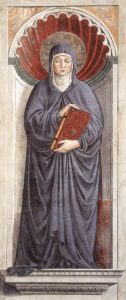Monica, Mother of Augustine of Hippo, 387
A Saint for Mothers
Today, the Church remembers Monica, Mother of Augustine of Hippo. To learn more about Monica, join us today at St. Alban’s for Holy Eucharist - Wednesday, May 4, 2022 at 12:10 p.m.
Zoom Evening Prayer
https://us02web.zoom.us/j/86781577595?pwd=VjNnZTZnUFFadkJPc3VOVTh3K21Idz09
Meeting ID: 867 8157 7595
Passcode: 530
Dial by your location +1 312 626 6799 or +1 346 248 779
The Collect:
Deepen our devotion, O Lord, and use us in accordance with your will, that inspired by the example of your servant Monica, we may bring others to acknowledge Jesus Christ as Savior and Lord, who with you and the Holy Spirit lives and reigns, One God, forever and ever. Amen.
We know about Monica almost entirely from the autobiography (the Confessions) of her son Augustine, a major Christian writer, theologian and philosopher (see 28 August). Monica was born in North Africa, near Carthage, in what is now Tunisia, perhaps around 331, of Christian parents, and was a Christian throughout her life. Her name has usually been spelled "Monica," but recently her tomb in Ostia was discovered, and the burial inscription says "Monnica," a spelling which all AC (Archaeologically Correct) persons have hastened to adopt. (On the other hand, it may simply be that the artisan who carved the inscription was a bad speller.) As a girl, she was fond of wine, but on one occasion was taunted by a slave girl for drunkenness, and resolved not to drink thereafter. She was married to a pagan husband, Patricius, a man of hot temper, who was often unfaithful to her, but never insulted or struck her. It was her happiness to see both him and his mother ultimately receive the Gospel.
Monica soon recognized that her son was a man of extraordinary intellectual gifts, a brilliant thinker and a natural leader of men (as a youngster he was head of a local gang of juvenile delinquents), and she had strong ambitions and high hopes for his success in a secular career. Indeed, though we do not know all the circumstances, most Christians today would say that her efforts to steer him into a socially advantageous marriage were in every way a disaster. However, she grew in spiritual maturity through a life of prayer, and her ambitions for his worldly success were transformed into a desire for his conversion. He, as a youth, rejected her religion with scorn, and looked to various pagan philosophies for clues to the meaning of life. He undertook a career as an orator and teacher of the art of oratory (rhetoric), and moved from Africa to Rome and thence to Milan, at that time the seat of government in Italy. His mother followed him there a few years later. In Milan, Augustine met the bishop Ambrose, from whom he learned that Christianity could be intellectually respectable, and under whose preaching he was eventually converted and baptized on Easter Eve in 387, to the great joy of Monica.
After his baptism, Augustine and a younger brother Navigius and Monica planned to return to Africa together, but in Ostia, the port city of Rome, Monica fell ill and said, "You will bury your mother here. All I ask of you is that, wherever you may be, you should remember me at the altar of the Lord. Do not fret because I am buried far from our home in Africa. Nothing is far from God, and I have no fear that he will not know where to find me, when he comes to raise me to life at the end of the world." *
* The Lectionary, James Kiefer, http://satucket.com/lectionary/Monnica.htm
And, May the Fourth be with you...
